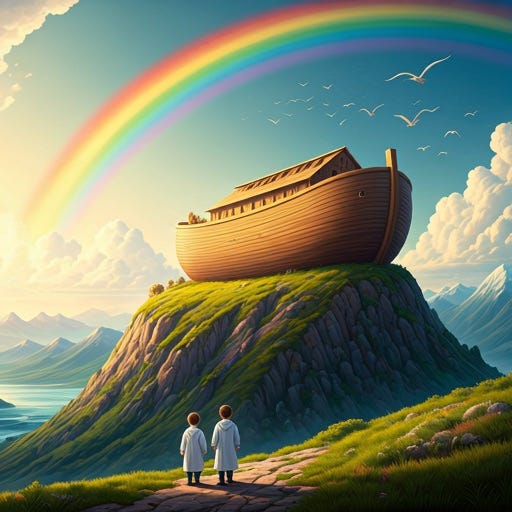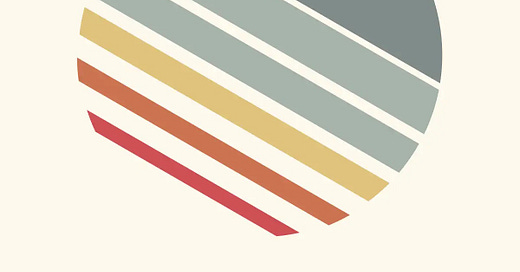
Discover more from Personal Science
Personal scientists are supposed to be open-minded, willing to entertain just about any idea that can explain a natural phenomenon. But are there limits to our open-mindedness?
I recently visited Ark Encounter, a Creationist theme park in Western Kentucky, noted for its life-size reconstruction of Noah's Ark. Can you be a personal scientist and take this seriously?
The story of Noah from Genesis 6 is both brief and simple, yet it has been told and retold for millennia. After the creation of the world, God warned Noah that humanity had become so corrupt that it was necessary to start anew by wiping out all living beings. God commanded Noah to build a large vessel, an Ark, to shelter him and his family during the impending flood that would engulf the earth. Noah was also instructed to bring aboard a male and female of every animal species, ensuring life would repopulate the earth once the floodwaters receded.
Ark Encounter is a theme park in western Kentucky whose developers take the Noah story as an actual historical event, with every detail exactly as described in the Bible. Most professional scientists, of course, ignore this as obvious pseudo-science: the earth only 6000 years old? All of today’s animals (and humans) descended from the creatures on board a boat?
But we’re personal scientists. We can afford to be more open-minded and speculative. With no tenure at stake or risk of losing a job for our unpopular beliefs, is there a way for us to take the Ark Encounter designers seriously?
When I visited the park last week, I was blown away by the professionalism and attention to detail you’d normally expect only from a Disney or other world-class theme park operator. The well-curated exhibits use intricate scientific terminology to explain the Noah story as an actual, historical event. No detail is left unexamined, from how the thousands of animals could have been housed and fed, to post-Flood explanations for fossils and apparent geological inconsistencies. If you come here intending to mock the overall idea, you better do a lot of homework. Trust me, these people have spent more time than anyone reading the evidence and thinking of all possible counter-arguments. You can’t just walk in and say “what about X”, because yes, they’ve considered X and yes they have a very detailed explanation that you won’t easily counter.
I tried to visit with an open mind. The Ark Encounter organizers emphasize the difference between observational science that you can reliably replicate, and historical science that depends on logical reasoning to extrapolate about events that can’t be replicated. Since it’s impossible to know for sure what happened in the past, they say, historical science rests on an interpretive foundation that depends on your assumptions about the past. They assume God created everything 6000 years ago; others assume natural selection and long periods of time. See, both assumptions are equivalent! No way to tell which is right.
But I came away unconvinced. I tried to take the curators seriously, but frankly I don’t have time to carefully evaluate all their arguments. The problem, I realized, is that people use “science” to mean three different things:
Nature: amazing facts about the natural world
Technology: engineering achievements, like spaceships or antibiotics
A Process: a systematic way of thinking.
Most people, including the Ark Encounter designers, use “science” in the first two senses. That’s why they think the Noah account deserves to be taught in schools; after all, it’s an amazing fact about the world, right? And their explanations certainly are amazing.
Be honest. Most of the “science” that you encounter—even in college or med school—essentially amounts to recounting various facts that teachers believe to be true about the natural world: Cholesterol causes heart disease, vaccines prevent measles, the sun is 93 million miles away. We believe these facts because most of our teachers say so.
Is that really any different from the “facts” told at Ark Encounter?
As a personal scientist, I’m happy to let others tell me all about their discoveries and ideas. But I care more about the process that gave rise to those discoveries because that’s the only way I can apply the ideas to my daily life. Instead of more “facts” about the natural world—cholesterol, measles, or for that matter a 4000-year-old Flood—I want to know how you came to understand those facts, and what counter-evidence would change your mind. I also want to know whether or how those facts apply to my situation. It does no good to know that cholesterol causes heart disease if that fact is not true for me.
Back in PSWeek 230629, we quoted noted physicist Richard Feynman’s belief that real scientists take all claims seriously—but not stop there. As we summarized then:
In other words, whether the Miracle at Lourdes is “true” or not is irrelevant to science, which is focused on the implications of the phenomenon. Similarly, whether we’re discussing the “truth” of climate change, vaccine efficacy, or even the Flat Earth, true science takes all theories seriously but demands that we challenge them with followup questions until we run out of ways to productively test the consequences.
The Ark Encounter people failed to convince me because their explanations are just empty facts. I can’t see how to apply those facts to uncover new facts, or refute old ones.
Is it True?
Meanwhile, I think it’s helpful to consider the tale of the Emperor’s New Clothes: a vain emperor parades naked, deceived by swindlers' claims of invisible clothes, until an innocent boy points out he’s wearing nothing. If somebody proved to you that the story is fiction, completely made up by a medieval Spanish author, would you dismiss it as “untrue”? Of course not. In some sense, that story—about the irresistible pressure to conform—is among the truest stories ever told.
Taken in a similar metaphorical context—about the consequences of an evil world, the necessity to prepare for disaster— the Noah story is just as true, perhaps even more true than any other story you’ve heard. I wish the Ark Encounter organizers understood that their elaborate reconstruction misses the point.
Personal Science Links of Interest
Time to get your free COVID test kits: US households are eligible to receive 4 free COVID-19 at-home test kits. Click here to order yours.
I don’t worry about genetic privacy as much as I should. My feeling is that bad actors can get my genetic data no matter what I do, so I may as well get myself sequenced so at least I have my genetic data. Still, the potential bankruptcy of 23andme brings some interesting issues about what happens when a defunct company’s health data assets are sold. The Law Office of August Bournique warns that, even if you ask that your data be deleted, companies can hide behind various California regulations that require them to keep everything for up to ten years for law enforcement purposes. One problem is that when companies go bankrupt, there’s often nobody left who knows (or cares) about deleting the data, and then all bets are off.
I don’t know the people behind https://socialbiohackers.com/ but they call themselves “The #1 community for biohackers”. It appears to be a well-done website, so might be worth watching.
Many popular podcasts seem to be sponsored by the supplement powder company, Athletic Greens, so I was interested in Healthline’s comprehensive review of AG1. tldr; at $3/day it’s an expensive way to get extra nutrition, but the reviewer thinks it might have helped a little on her n-of-1 test.
Co-designing a wiki-based community knowledge management system for personal science describes
the development of the Personal Science Wiki, an open repository for documenting and accessing individual self-tracking projects while facilitating the establishment of consensus knowledge.
William Briggs' takedown of that “study” that claimed intermittent fasting is deadly. Among other problems, the racial mix alone could probably explain most of the difference.
Worthwhile habit advice from Medium Daily:
According to one study, it can take between 18 to 254 days to form a new habit. One tactic to track your progress? A minimalist journal. A single dot, square, or symbol each day is all you need. Michal Korzonek, the expert in minimalist journaling, wrote six years ago: “Tracking my daily progress over a long period of time made me aware of the activities that I want to add or remove from my life. I remained progress-oriented, while noticing that I’m in fact succeeding and becoming consistent.”
About Personal Science
Be open-minded but skeptical. The motto of the Royal Society, established in 1660, Nullius in verba (“take nobody’s word for it”) asks us to be critical of all claims that we can’t verify for ourselves.
This newsletter is a weekly summary of a few observations we think will be interesting to anyone who wants to be a personal scientist. Paid subscribers can also read our Unpopular Science series, where we discuss science ideas that might get you in trouble, including reasons the theory of evolution is more complicated than you think.
If you have other topics you’d like to discuss, let us know.












It's a bit like with "trekkies": Lots of smart people with incredible attention to detail. But there has to be some suspension of disbelieve, with certain facts considered "canon". The one difference being that (most) trekkies know they are not talking about the real world 😀